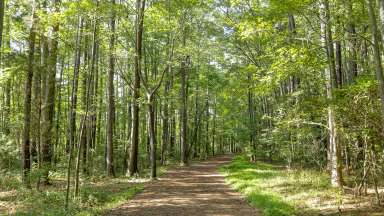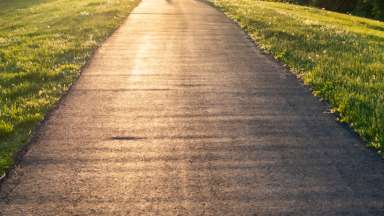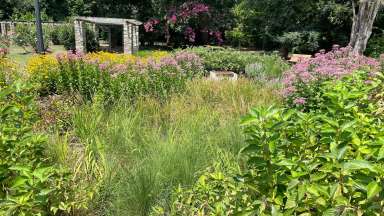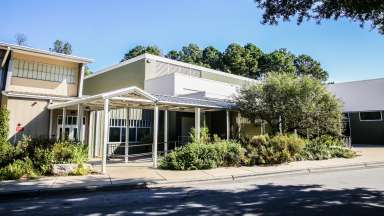Jump To:
Maureen Sherbondy
Visitors
By Maureen Sherbondy
Two Carolina wrens
perched in a longleaf pine
offer guidance.
I listen and abide.
Who am I to question
these brown-winged
birds who sing
and glide overhead,
so close
to the stars and heaven?
They inspire me
to follow a trail
to wander the banks
near the lake
for the sake of wonder.
So much is at stake
where I am just a visitor
passing through one place.
Maureen Sherbondy received an MFA in poetry from Queens University of Charlotte. She has twelve published books of poetry and has won multiple awards, including the NC Poet Laureate Contest, the Robert Watson Poetry Award, the Hart Crane Memorial Poetry Award, and others. Her poems have appeared in Southern Humanities Review, Calyx, Roanoke Review, and more. Her newest book, The Body Remembers, will be published in 2025. Maureen views writing poetry as a spiritual experience and is inspired by the views of nature outside her sunroom window.
Website: maureensherbondy.com
Lauren Bullock
Echo’s Lament
By Lauren Bullock
My sisters say I’m sticky
as silt, lovestruck and mud
lump soft on the river’s rim.
It’s gotta be that boy again.
again?
Mouthing the sound I suckle
down to its whisper. Drowning
must feel this close to breaking
the surface. It’s true, I watch
him watching himself, his want
sloppy as Jupiter stalking a sister
or someone like her. Narcissus
is always thirsty, every muscle
dense with desire. Memorized
them all by heart: stubbled lips
pressed in a palm, the bough
of his neck blooming with apple
at the ripple’s edge, his chest
flat as a skipping stone, curves
unheard of. I could even name
myself with his tongue if he said
it just once. Instead of the water
let him fall into me. I’ll swallow
only his swagger, squander
none of his shoulders’ breadth.
I swear, scarcely a drop of his
sweat could melt a nymph
into himself. Whatever winsome
he wastes I want. Whatever
mirror he watches pour into
my own. Each hour I wither
away waiting without knowing
what mimicry I will become,
but today he cries I love you
in vain, O marvelous boy!
before bursting into blossom
and it’s so easy, his sudden
shedding of flesh into golden
forgetting, that I almost
don’t name myself boy!
Lauren Bullock is a queer, genderfluid Black and Vietnamese writer, performer, and teacher. Lauren’s work has been featured by AFROPUNK.com, Button Poetry, The Smithsonian Asian Pacific American Center, The Human Rights Campaign, and more. Lauren is a Kundiman, Watering Hole, Pink Door, and Obsidian Foundation fellow as well as a Susan Laughter Meyers and Furious Flower Poetry Prize finalist. An educator of over 10 years, Lauren currently teaches middle school Language Arts and World Cultures in North Carolina. When not creating Lauren enjoys fighting crime as a costumed vigilante of many aliases.
X: @GoLaurenBullock
Instagram: @golaurenbullock
Website: golaurenbullock.com
Melanie Tafejian
Early Spring
By Melanie Tafejian
Light unfolds across the lake. Now you see
fishing lure tangled in a powerline.
Three turtles
sunning themselves. Down the path,
a little girl on a bicycle
ahead of her mother.
The pines,
their long shadows across the lake’s surface.
A branch arches over the edge of the water,
creates a circle. Like grief,
wherever you go, you carry
the lake in you.
The heron on one leg kneeling
in the shallow water.
Six cormorants drying their wings.
The wiry branches
beginning to bud.
Melanie Tafejian is a writer and educator originally from the Pacific Northwest. Her work appears or is forthcoming in The Georgia Review, Nimrod, Poetry Magazine, Poetry Northwest, and The Los Angeles Review, among other journals. Melanie received an MFA from North Carolina State University, where she now lectures in the First Year Writing Program.
George Callahan
Vows
By George Callahan
Smiling down at pine needles
once held by Loblolly up above
they know our steps, our favorite boots
by a soft landing they love
And Loblolly gave them all freely
he's a gracious giver, you see
and all his old wisdom he even gave
to the flighty honeybee
but you and me and bees
are hardly his only friends
Loblolly knows all the names
of the foxes and owls and wrens
Now he's smiling down at you
so gaze into his piney boughs
Loblolly dancing with Sun and Wind
fulfilling their ancient vows
George Callahan has lived in Raleigh for ten years. For seven of those years, George has lived alongside Lake Johnson, where he spends many mornings and afternoons walking, hiking, and thinking. Surrounded by towering pine trees and lake views, George finds plenty of inspiration at Lake Johnson throughout the year. He enjoys the ebb and flow of people, watching the seasons change, and the shady stretches of path immersed in the trees. George has been writing poetry since 2018 and focuses on nature, hiking, mountains, and travel in his work.
Website: pinetreepoet.com
Instagram: @fictiongeorge
Fred Joiner
Hear, Here
By Fred L. Joiner
all the water here
has been here,
all the earth, here
even these water bodies
we call man-made,
remake themselves,
in their own kin’s image,
the sable Atlantic,
the vast Pacific,
Superior, Victoria,
the systolic Niger,
the diastolic Congo,
the spinal Nile
they all hold
the hidden, the covered,
the out & gone, the buried,
the returned & returning.
I think of all stories the water
has yet to tell us, all the history & History
it has seen, all the tears & blood
it has swallowed, & returned
to dust, to cloud, to rain, to soil,
between them &
the Live Oaks,
the Bristlecone pines,
the Sequoias
the Redwoods,
even the moss & mushrooms
we would know everything if we listened.
Now, here I stand,
at this lake, in this place
of retreat,
like Carver, trying to be still
enough to hear the ancients.
Fred L. Joiner is a poet and curator based in Carrboro, NC. Joiner's work has been published in Obsidian, Callaloo, and other publications. and he has presented his work nationally and internationally. Joiner served as the Poet Laureate of Carrboro and was awarded a 2019 Academy of American Poets, Poets Laureate Fellowship. Joiner has also received awards, fellowships, and residences from the Smithsonian’s National Museum of African Art, DC Commission on the Arts & Humanities, and St Mary's College of Maryland. Fred's creative practice includes working with museums and cultural institutions to bring literary and interpretative engagements in alignment with visual art and other creative disciplines. He is the founder of Black Ekphrastic, a website that seeks to highlight the work of Black creative writers and their engagements with visual art and other art forms to think about and document a new kind of critical language around Black art.
Website: fredjoiner.com
Meg Day
Aubade to Day
By Meg Day
Last night I dreamt I’d forgotten my name
or driven it off like a fox through the split-rail
& into the long grass that can’t help but divulge
the direction of the wind. More than once,
I’ve been without—& more than once I’ve run
my padded bones along the braided bottom teeth
of summer, confusing heat with light & feeling
for the peak that christens predators with sharper
tongues than prey. There are some shades of night
so tender they swallow sound without chewing.
Pretend this is the first time you’ve seen me
crouch & tuck my hands under the resting scaffold
of a body limp with sleep, or worse. Pretend
your teeth don’t pull flesh from the peach’s pit
the way maggots eat around the tendons that hold
the heart inside the chest of the fawn felled by a fox
in the soundless down of that black yard. Where
is the sun! Look at the long grass open like a wound
where this small life left an even gentler night. Can
you see its blood across the door of my chest
like a promise? Can you hear me screaming my last
name into its neck as if it would turn the earth?
Deaf, genderqueer poet Meg Day is the author of Last Psalm at Sea Level (Barrow Street, 2014), winner of the Publishing Triangle’s Audre Lorde Award, a finalist for the 2016 Kate Tufts Discovery Award, and the co-editor of Laura Hershey: On the Life & Work of an American Master (Pleiades, 2019). The 2015-2016 recipient of the Amy Lowell Poetry Travelling Scholarship and a 2013 recipient of an NEA Fellowship in Poetry, Day’s work can be found in or forthcoming from Best American Poetry, The New York Times, Poetry Magazine, and elsewhere. Day is an Assistant Professor of English & Creative Writing in the MFA Program at NC State. Day’s newest poems are in search of a new sound, a Deaf sonics, which involves occupying natural landscapes and other spaces where sound is less manufactured, less urban, and tied more closely to the body’s natural rhythms—and therefore the rhythms of the poem.
Website: megday.com
John Hoppenthaler
Nature Still Serves this City
By John Hoppenthaler
They are precious,
our children, jabbing their oak sticks
into rich muck
rimming the edge of Lake Johnson.
They are hoping
to stir something up, something wild,
something that rears
awake, shimmers, then slips away
like a specter,
like the blue heron they’ve disturbed,
flapping, flapping
its dinosaur wings toward cover.
John Hoppenthaler’s books of poetry are Night Wing Over Metropolitan Area, Domestic Garden, Anticipate the Coming Reservoir, and Lives of Water. His poetry, essays, and interviews have appeared in Ploughshares, Virginia Quarterly Review, New York Magazine, Southern Review, Poetry Northwest, The Literary Review, Blackbird, Southern Humanities Review, and more. He also served as the personal assistant of Nobel Prize-winning writer Toni Morrison from 1997-2006. Professor of Creative Writing and Literature at East Carolina University, he serves on the Advisory Board for Backbone Press, specializing in the publication and promotion of marginalized voices. He lives in Raleigh with his wife Christy, his stepson Danny, and Pablo the dog.
Instagram: @hoppenthalerjohn
X: @jhoppenthaler
Pam Baggett
Lake Johnson, Late Winter
By Pam Baggett
I walk a dirt trail up a ridge past towering pines,
maples, oaks, past young beech trees
whose tan leaves, rustling in wind, will cling
until spring. Rocks protrude in the path,
and gnarled roots like bumpy spines of alligators.
The trail turns downward to a sandy-bottomed creek
where Christmas ferns thrive, leaflets shaped
like tiny green stockings. Poison ivy prospers too,
shaggy brown vines snaking up trees,
dangerous to touch. A hiker headed toward me
stops to wiggle out a piece of blue trash
wedged in the crevice of a loblolly pine’s bark.
She shakes her head, puts it in her pocket—
and suddenly I’m in love with this cold gray day,
with this woman who cleaned up after a stranger.
I climb another ridge, descend to lake’s edge,
dip a finger to gauge winter’s chill.
Fish dream in these frigid depths: bass, bream,
catfish, crappie. A Canada goose marches up
on his flat black feet, eyes me, hoping I’ll feed him.
Sorry, goose, go eat grass like you’re meant to.
A great blue heron stalks the shallows, legs hinged
forward at the knees, his pale orange shins
a sign of mating season. Bluebirds are building nests,
and any day now bull frogs will rise from winter’s sleep
in the mud, turtles climb back onto their logs,
children in their balloon-bright colors
come back to play. Though the sun says soon, soon,
an icy breeze ripples the water. The lake flashes
like a school of leaping silver fish.
Pam Baggett is the author of Wild Horses. She has won several awards, such as the Ella Fountain Pratt Emerging Artist Grant, two Artist Project Grants from the Orange County Arts Commission, a Fellowship in Literature from the North Carolina Arts Council, and was a runner-up for the Cathy Smith Bowers Chapbook Contest. Her recent work appears or is forthcoming in Atlanta Review, Kakalak, Poetry East, Tar River Poetry, Massachusetts Review, Poetry Daily, and more. While Pam’s educational background is in Environmental Politics and organic agriculture, she is heavily involved in the North Carolina literature and arts community, having hosted several reading series and writing workshops. Much of her current work engages with the beauty and mystery of the natural world.
Jamal Michel
This time the mushroom perambulate
By Jamal Michel
around the toes of sycamore and river birch.
Everything sepia tone and rutilant here smiles, even
the rotten industry encroaching a chocolate lab
lapping lake water cannot stop a good walk.
This place is kind to its interlopers. Like red-bellied
woodpeckers who want desperately to hollow
Southern magnolia–to gouge and tune
their narrow trunk like wooden ailanthus sounders.
These quiet, aging sentinels offer something indelible
to mine in red clay and sourwood. Can we lie
awhile, take in the company of a good love
with the sun still hot and gilded, and forgive what we buried?
Because beneath our childhood mango tree, a dirt bike trail
my father whipped up, smoke and my mother’s ire
choked him when my sister seared her tiny thigh
on the bike’s exhaust.
It was a precursor that brought us here, expelling us
from heartwood and maple. Tossing us outward.
Renaming us exuded amber.
Jamal Michel received an MFA in poetry from North Carolina State University. His poems have been published in The Missouri Review, the Minnesota Review, Apogee Journal, Linden Avenue Journal, and more. Aside from poetry, he also writes about politics, digital media, and video games, some of which has appeared in NPR, The Washington Post, Polygon, Poynter, and WIRED, to name a few. Jamal’s Afro-Caribbean roots inform his writing, much of which explores race, family, and love.
Liza Wolff-Francis
Finding
By Liza Wolff-Francis
I’ll tell you where. Away
from car traffic sounds, away
from the whir of humanity, winding
down the trail by Johnson Lake,
trees shadow over the green water.
There’s a sunlit shimmer on the ripples
at just the right time, clocked
to a moving sun. The ground scattered
with leaves, bursting with trunks beside
baby hollies, moss on rock, exposed
earth, like a fairyland peeking out.
Quartz juts from the ground, knobby
roots stick out of the land, wrap
around dirt like places to hold onto
if I need to crawl out of the Earth
to try to join with sky. A big oak tree
I can wrap my arms around lives up
toward the hill looking over the lake.
A crying of a crow above reminds me
of my size. Pine trees with large
puzzle pieces of bark like countries
on a map tower above, some pines
get crowded out in a forest like this.
Pine straw is spread out like a royal
carpet. Farther away from the road,
nature takes you in. A huge branch
has broken off of a tree, part of it drinks
the lake, part holds onto the land, insides
rotten, the dead tree waits for all the other
creatures who will love it.
In the low dips, there are Sycamores
with peeling bark and Beech trees. Here,
you can walk right down to the water,
curve of inlet, where, in the shallowing,
there may be a Blue Heron moving
in the lake, drawing one foot, one leg
at a time, out of the pull of water.
There at the edge, you might see all
there is to see in yourself, knowing
it’s all here whether you make it
about you or not.
Liza Wolff-Francis is the 8th Poet Laureate of Carrboro, North Carolina. She has an M.F.A. in Creative Writing from Goddard College. She wrote the play “Border Rising” which was performed in three cities. She has taught writing workshops for over a decade and has an ekphrastic poem published in Austin’s Blanton Art Museum. She was co-director for the 2014 Austin International Poetry Festival and now works organizing the West End Poetry Festival with the Town of Carrboro and the Carrboro Poets Council. Her poetry addresses a wide range of topics, and she considers herself an ecopoet, most recently writing poetry that addresses the climate crisis and human response to it. Her essay “Exploring Ecopoetry: Changing Definitions” was published by Valparaiso University. Her writing has been widely anthologized, and her poetry has most recently appeared in The Phare, Silver Birch Press, Wild Roof Journal, SLAB, and Kakalak. She has also written poetry book reviews that have been published on Adroit, Compulsive Reader, and LitPub.
Instagram: @lizawolfffrancis




